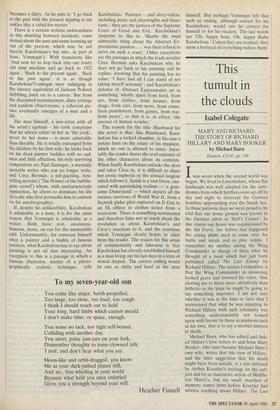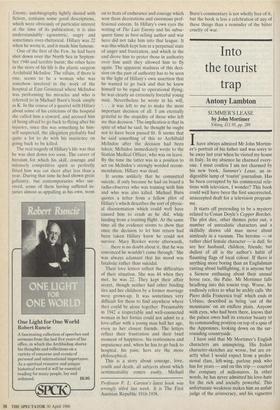This tumult in the clouds
Isabel Colegate
MARY AND RICHARD: THE STORY OF RICHARD HILLARY AND MARY BOOKER by Michael Burn
Deutsch, £12.95, pp. 249
Iwas seven when the second world war began. We lived in Lincolnshire, whose flat landscape was well adapted for the aero- dromes from which Spitfires soon set off by day and night to intercept the German bombers approaching over the North Sea. In those patriotic days we were proud to be told that our home ground was known to the German pilots as 'Hell's Corner'. In due course our house was requisitioned by the Air Force, but before that happened the young pilots used to come over for baths and meals and to play tennis. I remember my mother asking the Wing Commander in charge of them what he thought of a book which had just been published called The Last Enemy by Richard Hillary. The reason I remember is that the Wing Commander in answering looked grave and lowered his voice, thus alerting me to listen more attentively than hitherto in the hope he might be going to say something improper. I am not sure whether it was at the time or later that I understood that what he was imputing to Richard Hillary with such solemnity was something understandably not looked upon with favour by those in positions such as his own, that is to say a morbid interest in death.
Michael Burn, who has edited and link- ed Hillary's love letters to and from Mary Booker, who later became Michael Burn's own wife, writes that this view of Hillary, and the later suggestion that his death might have been suicide, is a slur initiated by Arthur Koestler's writings on the sub- ject and by an inaccurate article of Middle- ton Murry's, but my small snapshot of memory comes from before Koestler had written anything about Hillary. The Last Enemy, autobiography lightly dusted with fiction, contains some good descriptions, which were obviously of particular interest at the time of its publication; it is also understandably egocentric, angry and sometimes over-rhetorical. Hillary was 22 when he wrote it, and it made him famous.
One of the first of the Few, he had been shot down over the North Sea in Septem- ber 1940 and terribly burnt; the other hero in the story of his life is the plastic surgeon Archibald Mc1ndoe. The villain, if there is one, seems to be a woman who was somehow involved in the work of the hospital at East Grinstead where McIndoe was performing his miracles and who is referred to in Michael Burn's book simply as K. In the course of a quarrel with Hillary about some of his criticisms of the hospital she called him a coward, and accused him of being afraid to go back to flying after his injuries; since this was something he him- self suspected, the allegation probably had quite a lot to do with his insistence on going back to be killed.
The real tragedy of Hillary's life was that he was shot down too soon. The career of heroism for which his skill, courage and intensely competitive spirit so perfectly fitted him was cut short after less than a year. During that time he had shown great gallantry, but contemporaries who sur- vived, some of them having suffered in- juries almost as appalling as his own, went
on to feats of endurance and courage which won them decorations and enormous prof- fesional esteem. In Hillary's own eyes the writing of The Last Enemy and his subse- quent fame as best-selling author and war hero did not take him into that league. It was this which kept him in a perpetual state of anger and frustration, and which in the end drove him to pester those in authority over him until they allowed him to fly again. The apparent madness of this deci- sion on the part of authority has to be seen in the light of Hillary's own assertion that he wanted to go back and that he knew himself to be equal to operational flying; he was clearly an extremely forceful young man. Nevertheless he wrote in his will,
. it was left to me to make the most important decision of all. I am eternally grateful to the stupidity of those who left me that decision.' The implication is that in spite of what he said, he thought he ought not to have been passed fit. It seems that he said something of this to Archibald McIndoe after the decision had been taken; McIndoe immediately wrote to the Station Medical Officer, who was on leave. By the time the latter was in a position to act on McIndoe's strongly worded recom- mendation, Hillary was dead.
It seems unlikely that he committed suicide, if only because he had on board a radio-observer who was training with him and who was also killed. Michael Burn quotes a letter from a fellow pilot of Hillary's which describes the sort of physic- al disorientation which could well have caused him to crash as he did, while landing from a training flight. At the same time all the evidence seems to show that once the decision to let him return had been taken Hillary knew he could not survive. Mary Booker wrote afterwards,
. there is no doubt about it, that he was convinced he wouldn't come through.' She was always adamant that his mood was fatalistic rather than suicidal.
Their love letters reflect the difficulties of their situation. She was 44 when they met, he was 22. They kept their affair secret, though neither had other binding ties and her children by a former marriage were grown-up. It was sometimes very difficult for them to find anywhere where they could be alone together. Presumably in 1942 a respectable and well-connected woman in her forties could not admit to a love-affair with a young man half her age, even to her closest friends. The letters reflect their frustration and their brief moment of happiness, his restlessness and impatience and, when he has to go back to hospital, his pain; hers are the more philosophical.
This is a story about courage, love, youth and death, all subjects about which sentimentality comes easily. Michael Burn's commentary is not wholly free of it, but the book is less a celebration of any of these things than a reminder of the bitter cruelty of war.



























































 Previous page
Previous page